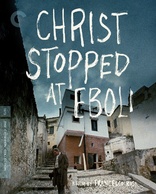Christ Stopped at Eboli Blu-ray Movie
HomeChrist Stopped at Eboli Blu-ray Movie 
Cristo si è fermato a EboliCriterion | 1979 | 222 min | Not rated | Sep 22, 2020
Movie rating
7.2 | / 10 |
Blu-ray rating
| Users | 4.0 | |
| Reviewer | 4.0 | |
| Overall | 4.0 |
Overview
Christ Stopped at Eboli (1979)
In the fascist Italy of 1935, a painter trained as a doctor is exiled to a remote region near Eboli. Over time, he learns to appreciate the beauty and wisdom of the peasants, and to overcome his isolation.
Starring: Gian Maria Volontè, Paolo Bonacelli, Alain Cuny, Lea Massari, Irene PapasDirector: Francesco Rosi
| Foreign | 100% |
| Drama | 67% |
Specifications
Video
Video codec: MPEG-4 AVC
Video resolution: 1080p
Aspect ratio: 1.32:1
Original aspect ratio: 1.33:1
Audio
Italian: LPCM Mono (48kHz, 24-bit)
Subtitles
English
Discs
Blu-ray Disc
Single disc (1 BD)
Playback
Region A (locked)
Review
Rating summary
| Movie | 4.0 | |
| Video | 4.0 | |
| Audio | 4.0 | |
| Extras | 3.5 | |
| Overall | 4.0 |
Christ Stopped at Eboli Blu-ray Movie Review
Southern Exposure.
Reviewed by Jeffrey Kauffman September 26, 2020Northern Exposure famously posited a "fish out of water" scenario where an eager doctor was thrust into an isolated rural enclave, left to foist for himself both in terms of his medical "career" but perhaps just as importantly in terms of being able to establish links to a new community which included a rather disparate and at times pretty eccentric group of people. While resolutely different in tone and style, Christ Stopped at Eboli is built around somewhat the same premise, albeit in an Italy giving way to the fascism of Mussolini. The film is based on a huge international bestseller from the 1940s which was a memoir by an Italian intellectual named Carlo Levi. Levi (played by Gian Maria Volonté in the film) has gotten himself in trouble with the powers that be (were?) in 1930s Italy, due to his antifascist activities, with the result being he's been exiled more or less to a remote region in southern Italy. What's kind of interesting about this scenario, at least in terms of any (obviously tangential) relationship to Northern Exposure, is that Levi's past as a medical student isn't immediately disclosed, and in fact at first he seems to be more of an artist and writer. There is a production side of things where Christ Stopped at Eboli and Northern Exposure have one thing in common: both properties were done for television, with Christ Stopped at Eboli airing on four nights in Italy in what might be considered one of that nation's fledgling attempts at a miniseries.
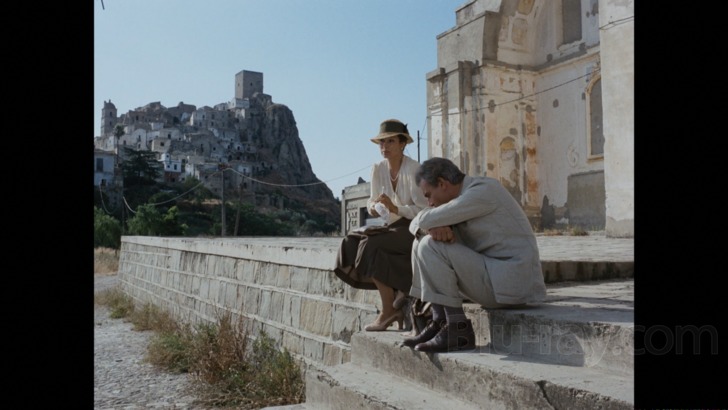
The entire story is bookended by segments finding an elderly Levi in Turin in 1937, surrounded by a literal art gallery (evidently the paintings utilized in the piece were actually painted by the real life Levi). The main part of the film is therefore a flashback taking place in the early thirties, detailing Levi's arrival in Aliano, an incredibly picturesque but still rather backward village where Levi's every move is going to be tracked, though in a reasonably friendly fashion, as personified by the town's Mayor Don Luigi (Paolo Bonacelli) , who alerts Levi to the fact that while there are other political prisoners "in residence" in Aliano, they're "riffraff", and obviously not of the same social standing as Levi.
According to a really interesting interview with translator Michael F. Moore (who did the "new, improved" subtitles for this release) included on this disc as a supplement, Christ Stopped in Eboli actually did receive a theatrical exhibition, though in a radically redacted form that cut this nearly four hour opus down to a more "manageable" length. That evidently cut out most of what makes this television version often so ingratiating, namely a kind of intentionally relaxed tempo that can be pretty vignette driven, offering insights into what village life in an isolated Italian community might have been like. As such, there's not a ton of narrative momentum to Christ Stopped at Eboli, and perhaps even more surprisingly, especially given director Francesco Rosi's history, there's not a ton of overt political critique, either, though of course the whole fascist element of Italy's own story can't be avoided and does kind of bubble under the surface a lot of the time.
And in fact one of the central issues that Christ Stopped at Eboli explores, one which is admittedly tied in at least tangentially to the political discord in Italy during the fascist era, is the "geographical" variances between the urban, supposedly more sophisticated north, including Turin where Levi had lived prior to his exile, and the rural, supposedly more "primitive", south. Levi may indeed be a "fish out of water" in these circumstances, but he actually doesn't have that hard of a time matriculating into his new environment, especially after his medical schooling becomes more widely known. Despite his frequent protestations that he's only had training and no actual on the job experience as a doctor, the villagers begin to ask for his help, and the region's recurrent troubles with malaria become an underlying plot element.
Somewhat late into this four part version both Levi's sister, Luisa (Lea Massari) and a peasant housekeeper named Giulia (Irene Pappas), enter the story, with both of these stories tending to point up socioeconomic issues in manifestly different ways (in fact a lot of the underlying dynamic here is Levi, obviously fairly well to do, having to confront a level of poverty he's never really seen before). There's also a kind of discursive subplot involving the local priest named Don Traiella (François Simon), who may have been exiled himself not necessarily due to his political activities, but instead due to certain indiscretions which seem positively prescient given some of the headlines the Catholic Church has weathered over the past several years.
For those with a bit of patience who are willing to let Rosi unspool his tale at his own speed, Christ Stopped at Eboli is often a beautifully wrought series of sometimes rather touching interactions. Some of these can be decidely "mundane", as in some of the antics of Giulia's adorable little boy, but others, including several between Levi and the villagers, manage to impart whole personal histories with a surprising lack of expository dialogue. The fact that Rosi closes two of the four episodes with freeze frames featuring either the stray dog Levi picks up early in the film or that aforementioned adorable little boy belonging to Giulia, may suggest that the director himself may have fallen prey to something one of the supplements mentions was criticized about Levi's original source memoir, namely that it over sentimentalized the past and tended to be too nostalgic for its own good.
Christ Stopped at Eboli Blu-ray Movie, Video Quality 
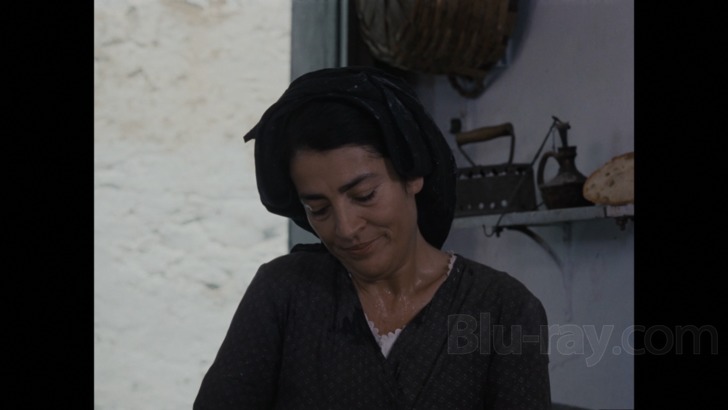
Christ Stopped at Eboli is presented on Blu-ray courtesy of The Criterion Collection with an AVC encoded 1080p transfer in 1.32:1. Criterion only sent a check disc for purposes of this review, so I'm not privy to any verbiage about the transfer which may be included in an insert booklet, though their website offers a "New 2K digital restoration, with uncompressed monaural soundtrack on the Blu-ray" comment on the listing page for the release. As mentioned above in the main body of the review, as Michael F. Moore mentions in his comments, while Christ Stopped at Eboli did screen theatrically (where it was presumably shown in a 1.66:1 aspect ratio), this was originally produced for and broadcast on television, so one presumes that this is close to what the original television broadcast looked like in terms of framings. There are some occasional damage problems which accrue here, notably some a weird looking vertical stripe that runs through the opening scene (see screenshot 17) and, later, several pretty rough looking moments where grain is fairly chunky and yellow looking. A few isolated moments, like that seen in screenshot 18, have that quality as well as further murkiness caused by some blue grading. Those issues aside, this is a generally pleasing looking transfer that preserves nice levels of fine detail even in some dimly lit interior environments, and which tends to look very good in the many outdoor scenes (as can hopefully be made out in some of the sunnier screenshots accompanying this review). In these sections, fine detail on elements like the stonework of the village is typically excellent and the palette is beautifully warm and suffused looking. While the palette looks natural overall, it tends to skew just slightly toward either browns or a kind of blue undertone at times, something that can make blacks a little on the purplish side and can lead to occasional crush. Aside from issues like the ones mentioned above, grain resolves naturally throughout.
Christ Stopped at Eboli Blu-ray Movie, Audio Quality 
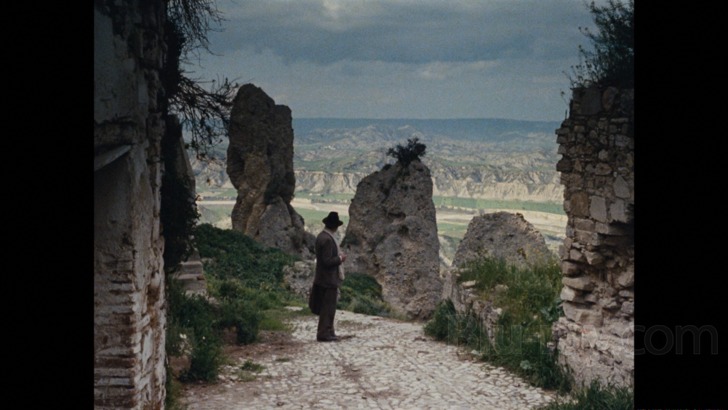
Christ Stopped at Eboli features an LPCM Mono track in the original Italian. This has a rather evocative sound design, at least for a perceived "made for television film", and that includes both some nicely warm sounding underscore (including strings and piano a lot of the time), as well as some nicely redolent ambient environmental sound effects, courtesy of the many outdoor scenes. Dialogue is presented cleanly and clearly throughout this problem free track. Optional English subtitles are available.
Christ Stopped at Eboli Blu-ray Movie, Special Features and Extras 
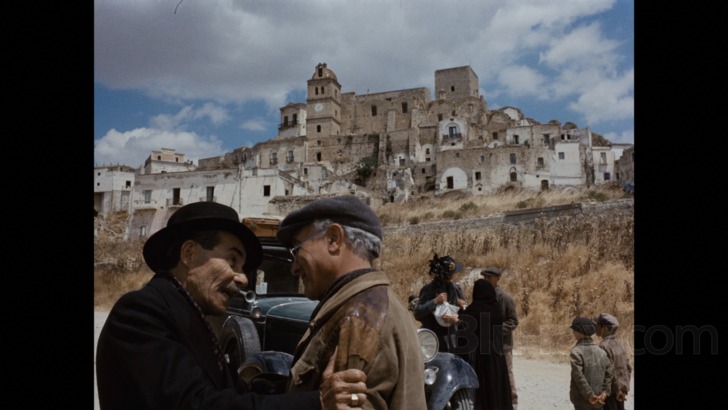
- Michael F. Moore (1080p; 27:28) presents the film's subtitle translator in a very interesting discussion of the film and some of it surrounding context.
- Reflections on a Political Cinema (1080p; 24:39) is a 1978 French television production which includes Rosi filming and talking about Christ Stopped at Eboli. In French with English subtitles.
- Bad Earth (1080p; 26:45) is another piece culled from French television, this time from 1974 which which offers a fascinating discussion between Francesco Rosi and the real life Carlo Levi. In French with English subtitles.
- Unico: Rosi Remembers Gian Maria Volonté (1080p; 13:09) offers some of the last interview Rosi gave before dying, where he reminisces about the star of Christ Stopped in Eboli. In Italian with English subtitles.
- Trailer (1080p; 1:48)
Christ Stopped at Eboli Blu-ray Movie, Overall Score and Recommendation 
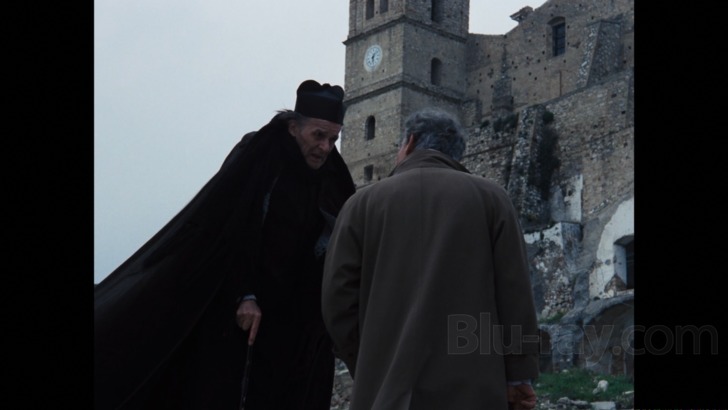
Christ Stopped in Eboli kind of reminded me of The Tree of Wooden Clogs in a way, at least insofar as the daily life of an isolated village or enclave is at the center of the story. Rather interestingly, at least for a "Rosi film", the political dynamic, while present, isn't thrust front and center, and instead a slower, more deliberate, set of character studies emerges. While it may have been preferable to have spread this out over two discs, especially given the length of some of the supplements, something that may have provided for some more "breathing room" which may have helped to ameliorate some of the issues noted above, technical merits are generally solid and the supplemental package is excellent. Recommended.
Similar titles
Similar titles you might also like

The Conformist
Il Conformista | 4K Restoration
1970

Taxi
2015

Umberto D.
1952

Hard to Be a God
Трудно быть Богом
2013

Il Divo
2008

No
2012

Mamma Roma
1962

Goodbye to Language 3D
Adieu au langage
2014

Hands Over the City
Le mani sulla città
1963

Three Brothers
Tre fratelli
1981

Loveless
Нелюбовь / Nelyubov
2017

Accattone
1961

Cemetery of Splendor
2015

Confucius
孔子 / Kong zi
2010

Luna
La luna
1979

Nostalghia 4K
1983

I Knew Her Well
Io la conoscevo bene
1965

Story of Sin
Dzieje grzechu
1975

The Assassin
刺客聂隐娘 / Ci Ke Nie yin niang
2015

La Dolce Vita
1960
